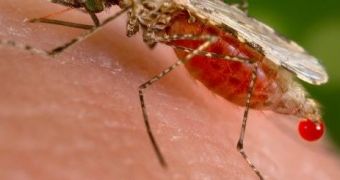On people's skin there are all sorts of bacteria, which researchers found to be more or less attractive to malaria mosquitoes.
Actually, skin bacteria turns sweat into certain odors, that mosquitoes recognize with an amazing precision.
PhD researcher Niels Verhulst made this discovery, and he also proved that the malaria mosquito like staphylococci, but is not attracted to pseudomonas bacteria.
The bottom line is that the more bacteria you have on your skin, the higher your chances are of attracting the Anopheles mosquito.
Someone's sweat does not smell on its own, the odor is only perceivable once the bacteria started working on the sweat.
For his experiment, Verhulst tested how mosquitoes reacted to five skin bacteria, and he did this both in Wageningen and in Kenya.
Once that was clear, he tested the sweat odor pf 48 volunteers on the Anopheles gambaie mosquito, and concluded that only one bacteria did not attract any mosquito at all – the pseudomonas.
Verhulst then wanted to find out which odor the mosquito prefers, and had odor analysis carried out in Germany, only to identify around 15 odors.
Another thing that Verhulst tested was whether the attractiveness for mosquitoes is genetic, as previous research already proved that genes determine our odor profile.
The researcher did find evidence that one gene in particularly, makes us so attractive for mosquitoes, but his results did not have statistical significance.
The next step is to come to a solid statistical basis and also to find the odor that mosquitoes prefer.
The research conducted by Verhulst is funded by the Gates Foundation, and the goal is to develop an odor trap for mosquitoes.
The problem is that until now, the odors identified by scientists are not efficiently enough, as mosquitoes will always choose the smell of human sweat.
But Verhulst is optimistic and says that “we now have a few odors that work well.
“We keep on adding odors to these top candidates, and then the mosquitoes let us know which odor they find most attractive.
“Like this we hope to get a more and more complex and effective blend.”
Verhulst will obtain his PhD on December 9, from Entomology professors Willem Takken and Marcel Dicke.

 14 DAY TRIAL //
14 DAY TRIAL //